Moshi-whatnow? “Moshi Moshi” da yo! This is the expression Japanese people use when answering the phone. But why on earth say it twice? Isn’t once enough for you?? Today I explain the reason for that giving oft-uttered phrase in a double dose. Moshi-Moshi, are you listening?
So Koichi over at Tofugu just recently published an article on the meaning of the words ‘Moshi Moshi’ in Japanese. Little did he know that I’d had this exact same topic brewing the vaults of my WordPress blog for sometime, after learning about it in one of my Japanese listening classes. But, as fortune would have it, Koichi’s well-researched and plausible reasons for why Japanese people say ‘Moshi-Moshi’ when they answer the phone are quite different from mine!
Why do Japanese people say ‘Moshi-Moshi’ twice?
I was introduced to this game show a couple of weeks ago. It’s called ‘Riyuu Aru Tarou’ (‘The guy with the Reason’, or something like that) on which the celebrities and comedians on the gameshow compete against one another to earn money. An audience of more celebrities listens to the salespitch: I’ll tell you the answer to this really interesting problem, if you pay me 1000 yen (about 5 pounds)! The celebrities then decide, on the basis of the salespitch, whether they want to hear the answer to the problem. Today’s problem? You guess it! ‘Why say ‘Moshi-Moshi’ twice on the phone?
First up, let’s look at the word. ‘Moshi Moshi’ is an abbreviation of ‘Mosu Mosu’ (the Japanese verb ‘to speak’). So, traditionally when you spoke out to someone, you would call them in this way.
But why not just once? Why call them twice? Apparently, the reason has to do with ghosts and ghouls (not the game!) Ghosts have a long history in Japanese culture – they are called 妖怪 (youkai).
According to the historian, saying ‘Moshi Moshi’ twice was the way to prove you were not a ghost. Apparently ghosts can only say ‘Moshi’ once!
So, what happens if a ghost calls out to you…’Moshi‘…and you turn around to answer..?
…They steal your soul! Ba-da-ba-boom!!!
So in order to prove that you are a nice, warm-blooded (and hopefully harmless) human being, you say ‘Moshi-Moshi’ twice, just to be on the safe side ^_^;.
This also goes for making a phone call. In order to show that you aren’t a vengeful ghoulie, you speak out to the other person and respond with ‘Moshi-Moshi’!
Which means bad news for this comedian – Ogi -san – as he says he answers the phone like this:
Moshi-Moshi?
Ah, Moshi. Ogi desu kedo.
What?? Moshi? It seems Mr. Ogi might be a ghost! o.O;
So there you go. The reason we say Moshi-Moshi twice. I hope for your sake you don’t say it only once! ^-^;
Here’s the video:









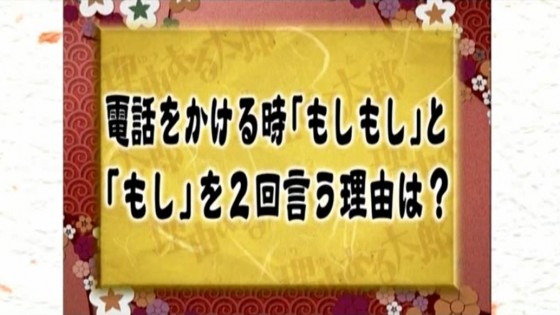
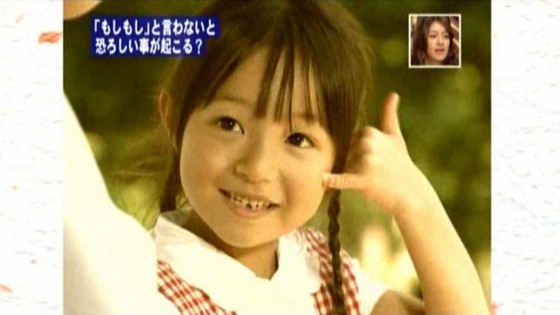
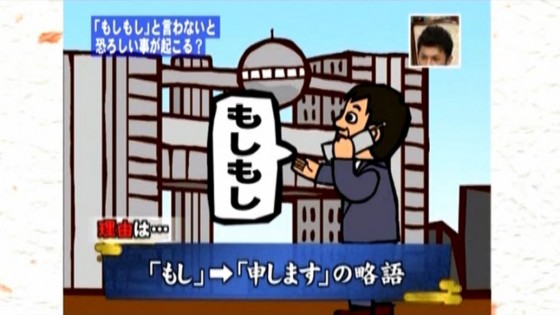
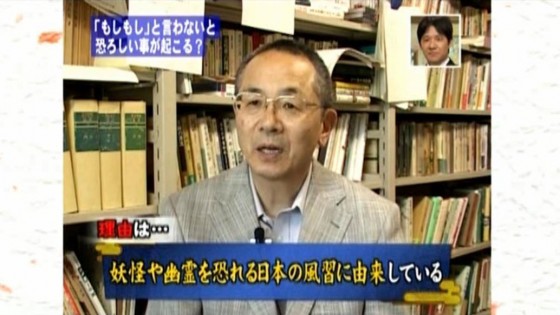
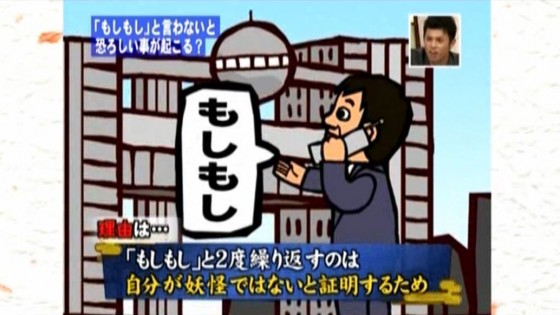
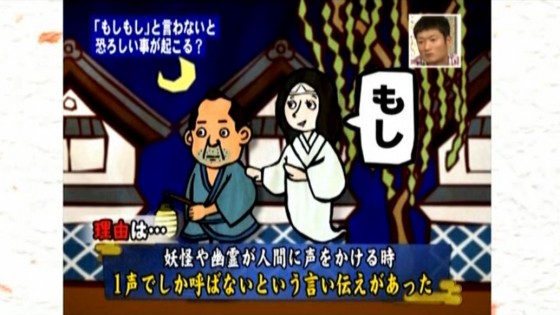
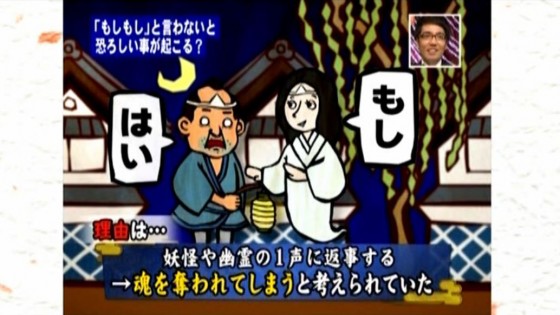
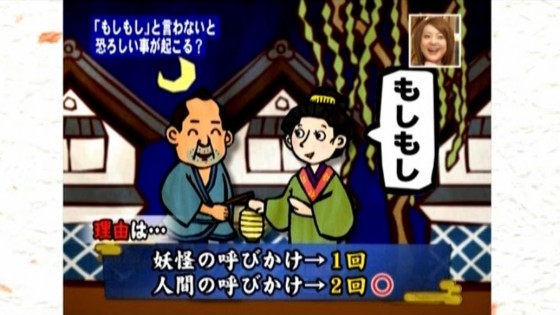
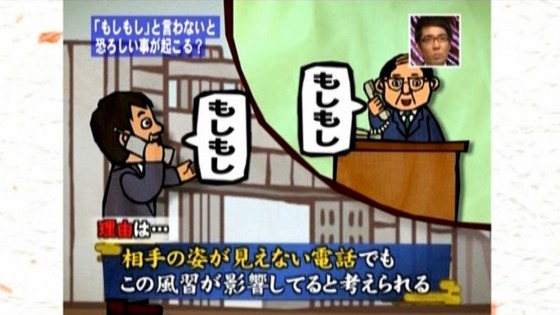
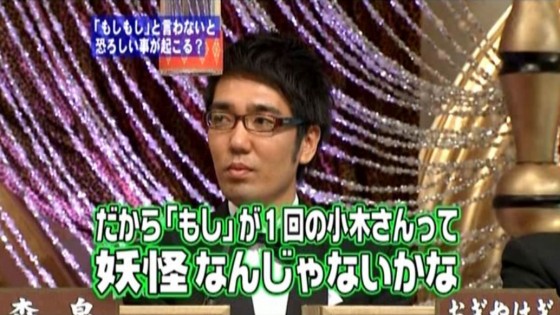
Moshi mina san
Is there a text (as in texting) equivalent to moshi-moshi? Something like taipu-taiou or kaku-kaku? Or with they were odd “Kakikomu” could be turned into “kaki-kaki” … ok, perhaps not… ^_^
What about ぴょこぴょこ and しゃぶしゃぶ? There are a bunch of words that can or do come in pairs! And in English too. For example, when you “like like” someone, or if your partner is fat, but not “fat fat”. Great article, but I dunno about this etymology. Sounds like folklore to me. http://japanese.stackexchange.com/questions/1543/where-does-%E3%82%82%E3%81%97%E3%82%82%E3%81%97-moshimoshi-for-answering-the-telephone-come-from. My question is, in English if say “I don’t like like him” the stress is present on the first ‘like’ but absent of the second occurant ‘like’. So then even though the word is duplicated, its stress-pattern is not. Are the pitch-accents of both the occurant ‘moshi’s the exact same (unlike English)?
I like it!!
bwahahahaha
i remember once i called my jap teacher i was like ” Moshi , naoko san ?”
and she was like Ha O.O!!!!
XDDDDDDDDD
i still do it =D.. even after i come bck from school and head to my jap class..whenever i see naoko san or takanori san i would say Moshi and Takanori’s daughter would go like ” Otosan, is she a ghost O.o?”
thnx for posting this =D!! and i like ur british n jap accent XDD!!
ur japanese is gud keep it up ^_^b
am from Dubai btw , dunno if uve been there haha
and gomen if i talk alot =__=”
Heyyo, I’m also from Dubai~ I know this comment is like 11 years old but Hi~
bwahahahaha
i remember once i called my jap teacher i was like ” Moshi , naoko san ?”
and she was like Ha O.O!!!!
XDDDDDDDDD
i still do it =D.. even after i come bck from school and head to my jap class..whenever i see naoko san or takanori san i would say Moshi and Takanori’s daughter would go like ” Otosan, is she a ghost O.o?”
thnx for posting this =D!! and i like ur british n jap accent XDD!!
ur japanese is gud keep it up ^_^b
am from Dubai btw , dunno if uve been there haha
and gomen if i talk alot =__=”
Hehe, interesing explanation it also reminded me, that I have to find a way to watch Japanese TV programs again :)
Hehe, interesing explanation it also reminded me, that I have to find a way to watch Japanese TV programs again :)
hey! this is also a great explanation! you guys rock!
hey! this is also a great explanation! you guys rock!
I’m pretty sure it would be a great ice breaker at a gokon ^^
Haha. One of the celebrities on the programme says exactly the same thing except for on the filming set of a drama!
I’m pretty sure it would be a great ice breaker at a gokon ^^
Haha. One of the celebrities on the programme says exactly the same thing except for on the filming set of a drama!
thanks for this. I have always wondered why it was said twice. thanks, also for mentioning this show looks very interesting.
thanks for this. I have always wondered why it was said twice. thanks, also for mentioning this show looks very interesting.
Wow, that was a lot more then a I expected. XD
Wow, that was a lot more then a I expected. XD
That was really interesting. Thanks for that.
Another interesting one is the origin of さようなら.
It’s a contraction of 「さようならば、これで別れましょう」
Haven’t run into anyone who’s known that yet. I think the もしもし origin is more interesting though.
Hi John, thanks for your comment.
Funnily enough, I happen to know the sayonara reason myself! I own an awesome little book that has the explanation in, but I think you’re probably right that not many people know the origins ^^
That was really interesting. Thanks for that.
Another interesting one is the origin of さようなら.
It’s a contraction of 「さようならば、これで別れましょう」
Haven’t run into anyone who’s known that yet. I think the もしもし origin is more interesting though.
Hi John, thanks for your comment.
Funnily enough, I happen to know the sayonara reason myself! I own an awesome little book that has the explanation in, but I think you’re probably right that not many people know the origins ^^
… and I was told that the reason was because the the expression was so old and back in the day when telephones had much lower sound quality you said it a few times until you were sure the sound make it through to the other side.
A bit like saying “check check check…” multiple times into a microphone.
Learned something new.
I’m sure it has many possible origins ^^. But I’m willing to bet this is the most interesting! :p
… and I was told that the reason was because the the expression was so old and back in the day when telephones had much lower sound quality you said it a few times until you were sure the sound make it through to the other side.
A bit like saying “check check check…” multiple times into a microphone.
Learned something new.
I’m sure it has many possible origins ^^. But I’m willing to bet this is the most interesting! :p
so what if a person only says moshi once, as a joke, does that make him a ghost?
thanks for the trivia.
Hi Casey. That seems to be the case! Those who Moshi once are either ghosts or pretending to be!
so what if a person only says moshi once, as a joke, does that make him a ghost?
thanks for the trivia.
Hi Casey. That seems to be the case! Those who Moshi once are either ghosts or pretending to be!
Hey that’s a great explanation. I enjoy the way you open up the wonders of Japanese variety programming to the masses too Michael, good work.
Thanks Brett! ^^ Proof that not all Japanese television is trash, as some people seem to think.
Hey that’s a great explanation. I enjoy the way you open up the wonders of Japanese variety programming to the masses too Michael, good work.
Thanks Brett! ^^ Proof that not all Japanese television is trash, as some people seem to think.
Mosu. ;)
Mosu. ;)
Haha, very nice! I just added a link to the bottom of my post directing people here should they want to know why you say it twice instead of once!
Much appreciated! Though I think I should give you private lessons on British accents! :P Nice video!
Ha! I was right! (check out the comments on the Koichi article)
I ain’t fraid of no ghosts
Well done! ^^
Haha, very nice! I just added a link to the bottom of my post directing people here should they want to know why you say it twice instead of once!
Much appreciated! Though I think I should give you private lessons on British accents! :P Nice video!
Ha! I was right! (check out the comments on the Koichi article)
I ain’t fraid of no ghosts
Well done! ^^